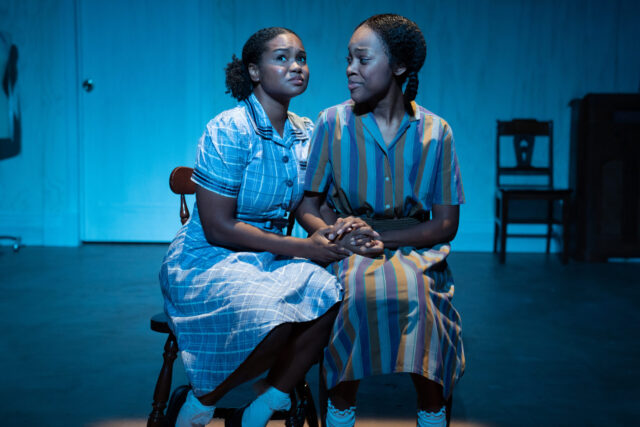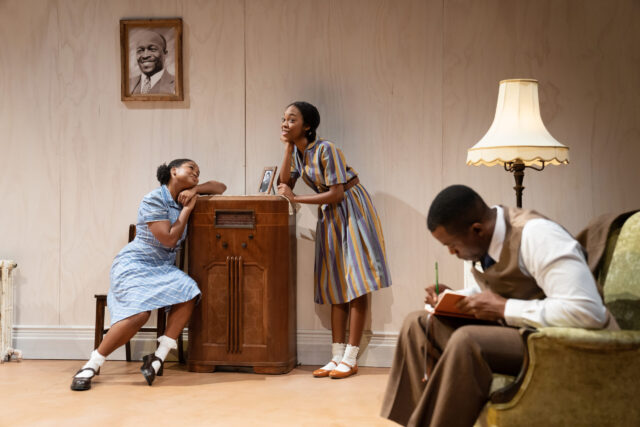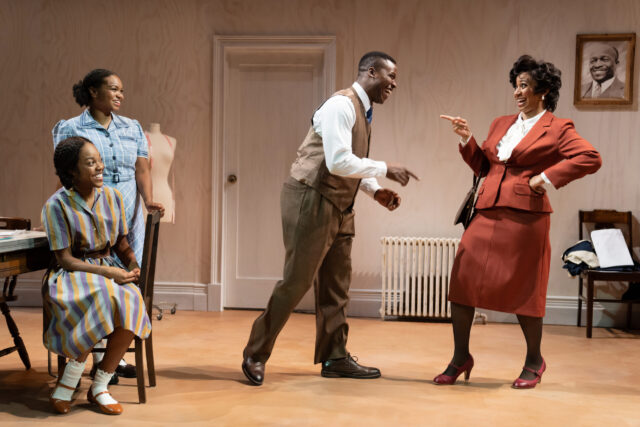
Sisters Ermina (Malika Samuel) and Ernestine (Shanel Bailey) face an uncertain future following the death of their mother in Crumbs from the Table of Joy (photo by Julieta Cervantes)
CRUMBS FROM THE TABLE OF JOY
Theatre Row
410 West 42nd St. between Ninth & Tenth Aves.
Tuesday – Sunday through April 1, $60-$85
www.keencompany.org
After watching Keen Company’s absolutely lovely revival of Lynn Nottage’s first play, Crumbs from the Table of Joy, which has not been seen in New York City since its 1995 world premiere at Second Stage, you’re likely to wonder, “What took so long?” Running at Theatre Row through April 1, it’s an intimate, relatable tale that smartly deals with loss, faith, and hope with a sweet-natured sense of humor.
No mere artifact from a playwright who has gone on to win two Pulitzer Prizes, Crumbs, despite its messy title, beautifully tells the story of the African American Crumb family, who have moved from Florida to Brooklyn following the death of Sandra, wife of thirty-five-year-old Godfrey Crumb (Jason Bowen) and mother to seventeen-year-old Ernestine (Shanel Bailey) and fifteen-year-old Ermina (Malika Samuel). Godfrey, who has a steady job in a bakery, has fallen under the spell of Father Divine, the real-life religious and civil rights leader who founded the International Peace Mission Movement and preached that he was God incarnate. His followers abstained from sex, drugs, alcohol, gambling, and foul language; in the Crumb apartment, there’s a small photo of Sandra on top of the radio console but a much larger picture of Father Divine hanging above that on the wall.
Godfrey moved the family to Brooklyn to be closer to Father Divine; as Ernestine, who serves as the narrator, often speaking directly to the audience, explains, “Daddy thought Divine’s Peace Mission was in Brooklyn ’cause of a return address on a miracle elixir boasting to induce ‘peace of mind.’ Divine was not in Brooklyn or New York City. But that didn’t diminish Daddy’s love. No, he let Divine strip away his desire and demand of him a monk’s devotion. This a man who never went to church and never tipped his hat to a woman, until we got to . . . Brooklyn.”

Father Divine hovers over the Crumb family in Keen revival of Lynn Nottage’s first play (photo by Julieta Cervantes)
Ernestine is a good student who is making her own white dress for her upcoming high school graduation; Ermina is more of a party girl, with a growing fondness for boys. Neither sibling is very happy with Godfrey’s devotion to Father Divine’s commands, which include new names for them all and “Virginity” symbols on their clothes. (The sharp costumes are by Johanna Pan, with lighting by Anshuman Bhatia and sound by Broken Chord.)
The unexpected arrival of Sandra’s sister, Lily Ann Green (Sharina Martin), shakes things up; Aunt Lily, who they haven’t seen in years, is a fun-loving Communist who wears flashy, sexy outfits and enjoy drinking, dancing, and staying out late with men. “Ya like my suit?” she asks Ernestine. “I bought it on Fifth Avenue, sure did, to spite those white gals. You know how they hate to see a Negro woman look better than they do. It’s my own little subversive mission to outdress them whenever possible. Envy is my secret weapon, babies. If ya learn anything from your Auntie let it be that.”
Godfrey is especially appalled that Lily has shown up with suitcases, ready to move in to fulfill a promise she had made to look after the girls. Lily stands for everything Godfrey is now against — although she is quick to remind him that that was not always the case. After a personal crisis, Godfrey heads out in search of Father Divine, but he creates chaos when he comes back home with Gerte Schulte (Natalia Payne), a white German woman.
Crumbs from the Table of Joy is exquisitely rendered from top to bottom. Brendan Gonzales Boston’s living room set features Godfrey’s chair at the right, where he fastidiously writes down questions to send to Father Divine, the kitchen table at the left, and, against the back wall, the radio, which Godfrey believes is a container of sin except when he listens to Father Divine on Sundays. “Ain’t no use in having a radio,” Ermina says. “Might as well be a log, ’least we could burn it to keep warm.” The dressmaker’s dummy on which Ernestine sews her graduation gown serves as a stand-in for the late Sandra, a constant reminder of her loss.

Lily (Sharina Martin) seeks to fulfill a promise in Crumbs from the Table of Joy at Theatre Row (photo by Julieta Cervantes)
Directed by Colette Robert (Weathering, Egress), the two-hour play (with intermission) proceeds at a graceful, relaxed pace, with plenty of room for the characters to develop and the narrative to evolve. Bowen (Long Day’s Journey into Night, If Pretty Hurts . . .) gives Godfrey a subtle vulnerability as the conflicted widower trying to find his path in life, while Martin (Round Table, The Extinctionist) injects energy and excitement whenever she’s onstage. Payne (Fairview, Aliens with Extraordinary Skills) is splendid as the persnickety interloper. Samuel (Our Dear Dead Drug Lord, Bernarda’s Daughters) is charming as Ermina, a teenager ready to burst out from her confining existence.
The centerpiece of the show is Ernestine, who is gorgeously portrayed by Bailey (The Book of Mormon, Grease: Rise of the Pink Ladies), a 2019 Syracuse graduate making her off-Broadway starring debut. Bailey instills the older sibling, who dreams about raising her station, with a soft, engaging tenderness. Several times she switches from her character in the play to her narrator/future self, explaining after a scene that it actually hadn’t happened that way: “At least I wish he had said that” or “Well, at least I wish she had,” she corrects, but she refuses to be held back by what might have been.
In this coming-of-age memory play, Nottage (Sweat, Mlima’s Tale, Intimate Apparel) touches on themes that will show up in her later works, from institutional racism, workplace inequality, and sociocultural change to the act of sewing itself; her great-grandmother was a seamstress in New York City at the turn of the twentieth century. Ernestine’s almost desperate desire to finish her graduation dress is not only a metaphor for the challenges her family faces but for the glorious career Nottage began stitching together with Crumbs.